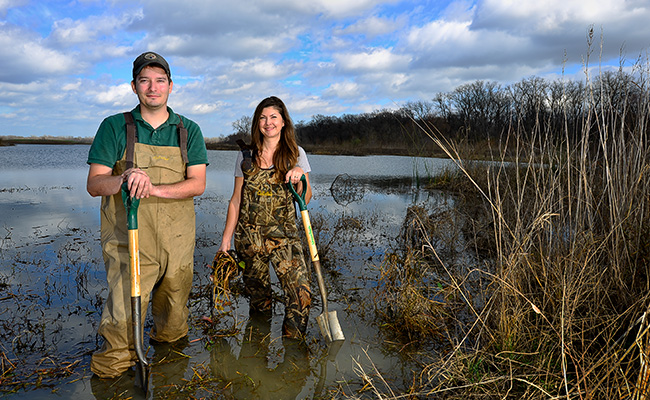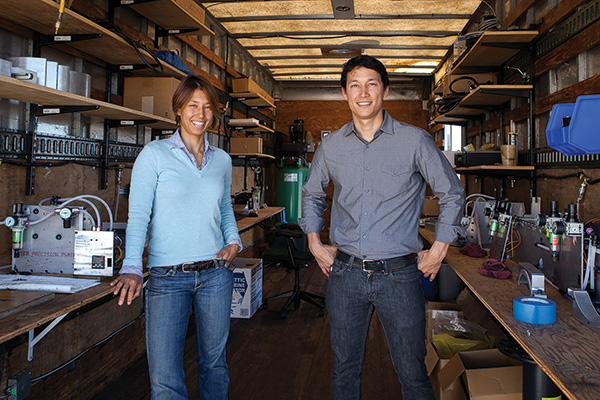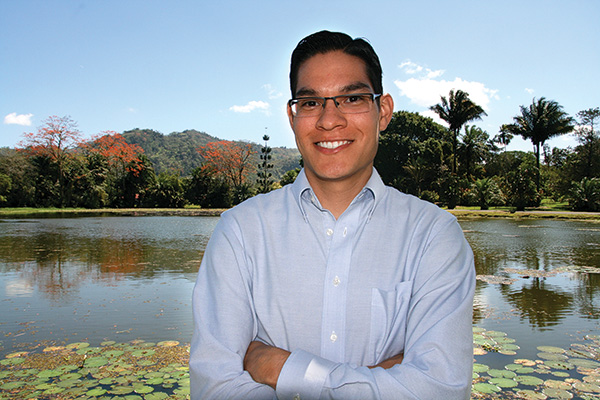Protecting the Environment
Forward-thinking alumni help preserve waterways, air quality, and plant and animal
life through sustainable and renewable solutions.
March 30, 2013

Environmental sciences master's student Aaron Schad and Lynde Dodd ('99,'04 M.S.)
are part of the U.S. Army Corps of Engineers Engineer Research and Development Center's
ecology team. They restore natural ecosystems in urban landscapes, such as a wetland
chain in an abandoned golf course as part of the Dallas Floodway Extension Project.
(Photo by Michael Clements)
Southeast of downtown Dallas, an abandoned golf course has been reincarnated. Gone are the manicured greens. Instead, a 123-acre wetland and 102-acre grassland area teems with fish, waterfowl and herons. Bulrushes and spikerushes line the banks, along with submerged aquatic plants, providing habitat for aquatic insects and preventing soil erosion.
The wetland chain is part of the Dallas Floodway Extension Project, a joint venture between the U.S. Army Corps of Engineers and the city of Dallas to maintain and manage the Trinity River flood waters. The wetland chain provides a swale for excess water, preventing the river from flooding nearby houses and businesses when there is heavy rain. The area also provides extra polishing for the city's treated wastewater before it flows into the Trinity.

Gia Schneider ('95 TAMS) and her brother Abe Schneider ('98 TAMS), founders of San
Francisco-based Natel Energy, developed a patented low-cost, low-impact system that
can generate electricity from manmade waterways, irrigation canals and nonpowered
dams. (Photo by Melissa Barnes)
Lynde Dodd ('99, '04 M.S.), a graduate of UNT's environmental sciences master's program, and Aaron Schad, a student in the program, are helping with this transformation back to nature. They are part of the corps' Engineer Research and Development Center. The ecology team works to research, enhance and restore aquatic plant communities across the nation.
"Stewardship is so important to me and I learned it from my UNT professors," Dodd says. "They taught me the importance of being responsible for the land and protecting the environment in which we all live."
Dodd and Schad are among a growing number of UNT students and alumni who are working to safeguard our land, water, air, plants, animals and people. Some, like Dodd and Schad, work on the front lines of restoration. Others, such as Gia Schneider ('95 TAMS), co-founder of a hydropower technology company, and Ross McCausland ('84 M.B.A.), an energy consultant, develop renewable energy sources.
Students like Andrew Hernandez, who interns for a leading heating and cooling systems company, work to create more energy-efficient systems and products, while graduates like Eric Norman ('08, '12 M.S.) help make tourism more eco-friendly. Even famous UNT alumni such as musician Don Henley have made their mark. Henley is helping to preserve Caddo Lake.
All got their start at UNT, where students can choose many paths to "green" careers, studying areas from energy engineering to sustainable tourism. With an eco-friendly legacy that dates back to water research in the 1930s, UNT combines an earth-friendly philosophy with hands-on experience in sustainable approaches and technologies.
"Being green" has become a core part of the university's campus culture. Not only is the university constructing LEED-certified buildings, including the environmentally friendly Life Sciences Complex, Business Leadership Building and Apogee Stadium, but UNT also has strong recycling programs and gets nearly half of its energy from renewable sources. Students also enjoy amenities such as an all-vegan cafeteria, electric car charging stations and human-powered, energy-producing elliptical exercise machines. UNT has earned numerous green distinctions, including recognition by The Princeton Review as a Green College and a ranking among the world's most sustainable universities.
With sustainability a fundamental part of the university's programs and practices, UNT students and graduates have the edge in pursuing green careers and embracing sustainability as a way of life.
Functional ecosystems
Dodd and Schad both chose UNT for its environmental sciences program and say their classroom learning has been essential in their fieldwork.
They point to biology faculty members — Regents Professor James Kennedy, Professor Emeritus Ken Dickson and professors Tom La Point and Tom Waller — as instrumental in teaching them how to protect and respect the environment.
Dodd, who supervises the ecology restoration team, says taking classes on such topics as toxicology and conservation opened her eyes to how important wetlands are to mitigating pollution and reducing excess nutrients in an ecosystem.
"The UNT program is well-rounded and the faculty members are so passionate about their work," Dodd says. "They get you involved and interested."
Schad says because the program focuses on applied research, he puts his knowledge into practice right away.
"I'm using the skills I've learned from my classes in my work now," he says.
Dodd was so impressed by Schad's expertise and knowledge of geographic information systems and plant life when they took a course together that she hired him as a research assistant, a position that will become full-time when he graduates in May.
Based at the corps' Lewisville Aquatic Ecosystem Research Facility, Dodd and Schad help to create and restore natural ecosystems in urban landscapes. Their work involves studying the chosen area, which can be wetlands, grasslands or forest, and then establishing and managing native plants to create wildlife habitats.
"We try to make functional ecosystems with many vegetative growth forms,"Schad says. "I like seeing plants and animals work how they should ecologically."
Hydropower
While Schad and Dodd are preserving water quality, Schneider and her brother, Abe ('98 TAMS), a fellow Texas Academy of Mathematics and Science graduate, are using water's power to produce energy.
Most people would look at an irrigation ditch and think it's nothing more than a slow-moving waterway. The Schneiders think "hydropower."
As founders of San Francisco-based Natel Energy, they have developed a patented low-cost, low-impact system that generates electricity from manmade waterways, irrigation canals and nonpowered dams with drops between 5 and 25 feet. Across the U.S., these "low head" water infrastructures can produce as much as 7 gigawatts of electricity — enough to power more than 100,000 homes.
The Schneiders, also both graduates of the Massachusetts Institute of Technology, used their education, training and passion to create the niche company. Natel Energy's systems not only produce power from previously untapped sources, they have minimal impacts on aquatic life and the environment because of their eco-friendly design and low-impact installation, Gia Schneider says.
Schneider says what she and her brother learned at TAMS, a program in which talented students simultaneously complete their first two years of college while finishing high school, shows up in their work now.
Both did their TAMS research in environmental science. She completed a GIS mapping project, then helped her brother research the impact of beaver dams on river ecosystems in Colorado.
"The beaver dams were the initial model of distributed small dams and got us thinking about how to build projects that fit into the ecosystem," she says. "TAMS was my first exposure to the applied scientific process and more independent thinking."
Creating more renewable energy gives the U.S. a competitive advantage, reduces reliance on fossil fuels and minimizes climate change impacts, Schneider says.
"There is something very satisfying about finding ways we can be conservative with our resources," she says. "If we can do more with less, it's better for our kids and our future."
Renewable energy

Ross McCausland ('84 M.B.A.), founder and CEO of Protos Energy Advisory in Amarillo,
works as a power development and energy consultant helping developers start up energy
plants, from wind, solar, geothermal and biomass to natural gas plants, throughout
the nation. (Photo by Michael Clements)
Renewable energy also drives McCausland, founder and CEO of Protos Energy Advisory, though on a wider scale. He's an independent power development and energy consultant based in Amarillo who helps developers across the nation start up power and energy plants, from wind, solar, geothermal and biomass to natural gas plants. As a consultant with a finance background, he finds the right site, clears legal hurdles and searches for financial backing — everything up to the point of commercial operations.
He has been in the energy business for three decades — long enough to see the development cycles of both nonrenewable and renewable energy. And he moves with the market.
McCausland, who started in the energy business through finance, spent the first part of his career working for independent power producers, mainly on natural gas-fired, cogeneration and biomass power plants. Then he worked on his first wind power project in the late 1990s and his projects quickly shifted to renewable energy development.
The pendulum is now swinging back to natural gas generation due to changing Environmental Protection Agency regulations, and so, too, is McCausland's work.
A chartered financial analyst, McCausland says earning an M.B.A. from UNT has been a good complement to his work experience. At UNT, he got a solid understanding of numbers, marketing, business analytics and the cycle of capital markets — all essential to his work now. UNT's M.B.A. program is well-regarded for its support and training, ranked 20th nationally among Best Online Graduate Business Programs by U.S. News & World Report.
"The M.B.A. program has an excellent reputation," McCausland says. "It was a great opportunity to grow and build a career."
A board member of Class 4Winds Inc., a renewable energy advocacy group, McCausland remains passionate about renewable energy development for its environmental benefits. But he points out that even natural gas plants have benefits as they have a smaller footprint, they can be more easily controlled for production and their emissions are getting cleaner.
"In a perfect world, I would rather use solar, wind, biomass and geothermal applications," he says. "Whether you argue if it's good or bad science, global warming is going to be a factor when building the power sources of the future."
Efficient technologies

Mechanical and energy engineering senior Andrew Hernandez is helping to develop a
solar-powered generator to more efficiently convert sunlight to electricity as part
of a senior design capstone class. He also works as an intern with Dallas-based Lennox,
a high-efficiency heating and cooling systems company. (Photo by Michael Clements)
Hernandez thinks about the environment differently, trying to make things run better. As a senior in UNT's mechanical and energy engineering program, he has been taught to think, "How can I make technology more efficient?"
For his senior design capstone class, Hernandez is part of a student team designing and developing a solar-powered generator that more efficiently converts sunlight to electricity.
As an intern at Dallas-based Lennox, a high-efficiency heating and cooling systems company, Hernandez is part of the team working to make commercial rooftop systems more efficient. He hopes it will become a full-time job after he graduates in May.
UNT's mechanical and energy engineering program's innovative approach to engineering has made it an increasingly popular choice, with enrollment growing rapidly since it was established in 2007. And with the program's recently opened Zero Energy Laboratory, students and faculty study firsthand the next generation of renewable energy technologies.
"Faculty motivate us to develop ways of determining inefficiencies in current systems and then to find solutions and improvements — skills that can apply to any industry," Hernandez says.
He adds UNT also has taught him how to work well in a team, while being productive — all of which helps him excel at Lennox.
For instance, his team was looking to improve the airflow going through the outdoor condenser section of rooftop units to use less power and run more efficiently. After brainstorming with his supervisor, Hernandez proposed an idea, which led to an analysis that suggests there would be an improvement in the performance. He says he was able to offer his idea because he learned to think differently about technology at UNT and acquired the confidence to speak up.
"The faculty members have provided me with basic tools, knowledge and fundamentals," Hernandez says. "They've also pushed me to think outside the box."
Sustainable tourism

Eric Norman ('08, '12 M.S.), a research assistant at CATIE in Costa Rica, teaches
hotel, lodge and tourism operators how to run a sustainable business and educates
students in the program on environmentally friendly operations. (Photo by Joanna Rodriguez)
Like Hernandez, Norman has UNT faculty members to thank for nurturing his passion for sustainability and for his success. He is one of the first graduates to receive the university's "green degree," a master's degree in international sustainable tourism through a joint degree program of UNT's College of Merchandising, Hospitality and Tourism and CATIE (Tropical Agricultural Research and Higher Education Center) in Turrialba, Costa Rica. The program, also called MIST, is one of the first of its kind and is focused on developing low-impact tourism and sustainable tourism.
For Norman, who earned an undergraduate degree in hospitality management from UNT, the program pushed him to think of tourism and sustainability as complementary, not competing, interests and to understand the needs and expectations of travelers and businesses.
Now a research assistant for CATIE, Norman is working as a liaison between the institute and UNT and helping to recruit students. He teaches hotel, lodge and tourism operators in Costa Rica how to run a sustainable operation and educates students in the program on how to help businesses be more sustainable.
"I have been able to combine theory and practice and translate what I know to business owners," Norman says. "Real sustainability requires a great deal of creativity and the ability to comprehend how decisions have global consequences — it's about looking for connections to maximize benefits, reduce waste and ensure the system can go on indefinitely."
At UNT, green is more than the school color.
It represents the university's long-standing commitment to caring for the environment. Here's why UNT has been ranked among the world's most sustainable campuses for its green efforts, including being named a Green College by The Princeton Review two years in a row:
- Texas' first large public university to sign the American College & University Presidents Climate Commitment, pledging to adhere to more stringent environmental standards and promising to achieve at least LEED Silver certification on new buildings
- Opened four LEED-certified buildings — the Life Sciences Complex, the Business Leadership Building, Apogee Stadium and Highland Street Parking Garage — in two years
- Uses wind turbines to help generate power for UNT's Apogee Stadium, the first new construction college football facility in the nation to earn LEED Platinum certification — the highest level
- Recently opened the Zero Energy Laboratory, the first of its kind where students and faculty can study firsthand the next generation of renewable energy technologies
- Installed electric vehicle charging stations on campus
- Gets nearly half of its energy from renewable sources, has reduced its carbon footprint by a half-billion pounds and will save about $3 million annually through energy savings efforts that include making more than 120 buildings on campus more energy efficient
- Recycles more than 360 tons of paper and cardboard, nearly 5,000 pounds of aluminum cans and 600,000 plastic bottles each year